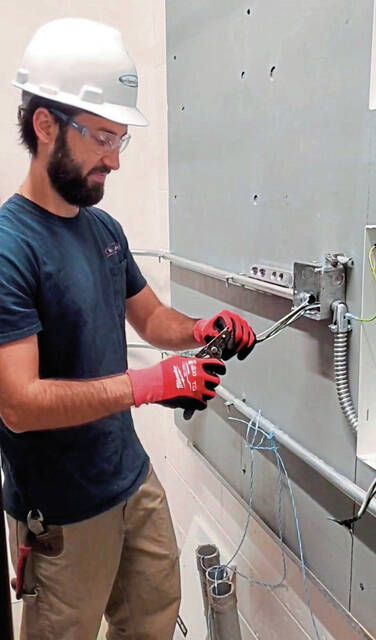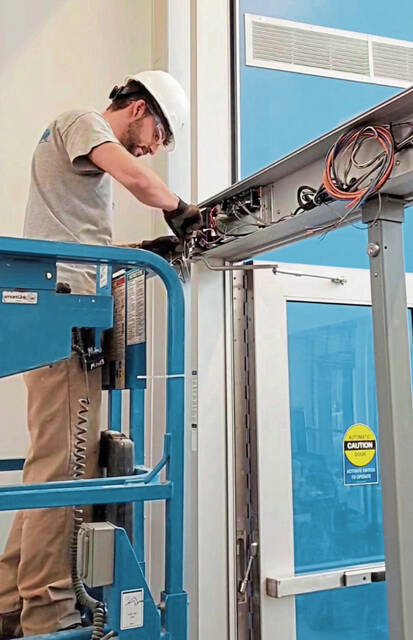In the years leading up to his graduation from Hampton Township High School in 2019, Nic Michielli discussed his future with district staff.
“When I told my high school guidance counselor that I probably wasn’t planning to go to college, the conversation pretty much ended there,” Michielli said.
With a father and uncle who worked as electricians, Michielli, 21, had a window into the type of career available in the skilled trades. Michielli’s father earned his position through classes at Associated Builders and Contractors of Western Pennsylvania.
Now, Michielli is a fourth-year apprentice with the Merit Electrical Group, having also undergone ABC training and taken part in its apprenticeship program.
“Right now, we have 10 apprentices,” said Donna McGinnis, Merit’s workforce development manager. “But finding a good apprentice is hard. There’s a lot of stigma around the trades and vo-tech education, and sometimes people don’t know what an apprenticeship is.”
McGinnis, ABC and others are working to change that.
‘We can’t start young enough’
Pennsylvania and other states throughout the U.S. have been dealing with a skilled-labor shortage exacerbated over the years by the 2008 recession, the ongoing wave of baby boomer retirement and, most recently, the covid-19 pandemic.
One way states are seeking to boost that workforce is through apprenticeship programs. The U.S. Department of Labor estimates new apprenticeships have grown by 64% nationwide since 2012, along with 14,700 programs created in the past five years.
Pennsylvania officials have invested more than $28 million since 2018 in state apprenticeship programs, including $11 million in grants in April.
The latest round of grant funding is aimed at supporting apprenticeship programs with a specific focus on diverse talent, underserved populations, nontraditional occupations and programs that align with secondary and post-secondary education.
Global nonprofit Junior Achievement has been focusing on underserved populations for years. But Western Pennsylvania Vice President Bill Lucas said staff came to realize that another area that demanded attention was the variety of careers they were introducing to young people.
“One of our volunteers came to a board meeting a few years ago and said, ‘You guys are doing a great job at introducing kids to jobs that require a four-year education.’ He felt we were really missing the boat in educating kids about skilled trades,” Lucas said. “He was right.”
They began approaching local companies about Junior Achievement’s “JA Biztown,” its South Fayette facility that provides an immersive experience for fourth, fifth and sixth graders through nine hours of learning about personal finance, community functions, basic civics and more.
“The companies told us that we can’t start young enough when it comes to introducing kids to these jobs,” Lucas said.
Junior Achievement was the recent beneficiary of a state labor grant dedicated to connecting students with apprenticeship opportunities. The Careers in Skilled Trades initiative, which JA officials said will be ready by the end of the next school year, is an approved pre-apprenticeship program that will launch as a pilot in the Pittsburgh area next spring. The goal is to bring it to 100 area schools and ultimately extend the program to more than 330 Western Pennsylvania schools by 2024.
“It will be a feeder system for programs that already exist out there, helping them connect the dots,” Lucas said. “We want to be an interconnector for all these opportunities.”
‘Earning while you’re learning’
At Rosedale Technical College in Moon, where officials unveiled the first phase of an expansion June 16, students in the experiential learning program work a modified style of apprenticeship, according to education director Kara Chan.
“We try to find employers who are going to provide a great work training environment,” Chan said. “Students keep a journal and track their progress, and we look at that to see if their practical experience aligns with the curriculum and theory they’re learning in the classroom.”
Chan said the program lets apprentice trainers become a more integral part of the training.
“We’ve also seen that students are more likely to stay where they were placed if they feel the employer really cares about their education and developing the real-world job skills they need,” she said.
Brandon Richards of Latrobe is a perfect example.
After making the decision to attend Eastern Westmoreland Career and Technical Center, Richards began learning how to machine metal, and through involvement in the BotsIQ robotics competition, he began to learn about computer numerical control, or CNC, machining.
“My vo-tech teacher used to work at Penn State Tool & Die, and he suggested I look into their apprentice program,” said Richards, 21. “It’s been smooth sailing from there.”
Working through the National Tooling & Machine Association’s apprentice program, Richards tested out of his first year and, after three years of apprenticeship, graduated from the program June 8.
“The world runs on manufactured things, so someone who can do machining is always going to have job options,” he said.
Austin Zigmond, 21, of Carnegie used to help his stepfather with electrical work around the house. He said that without that bit of exposure to the skilled trades, he might not have made the decision to attend Parkway West CTC in high school.
Before he graduated from Parkway West, he already had secured an apprenticeship with Merit, and a few short months later, he began taking classes at ABC and is now in the fourth and final year of his apprenticeship.
“Choosing to go to a vo-tech was the best choice I made,” Zigmond said. “That’s what set my interest and made me want to do it. And having the prior knowledge helped a lot when I was going into hands-on work with a real electrical company.”
For Michielli, working with a company like Merit has been very gratifying.
“We do everything — electrical, lights, HVAC, pretty much everything that depends on electricity,” he said. “We’re working on a huge school in Seneca Valley, and it’s really cool to step back and see that what started as hypothetical blueprints is now becoming a reality.”
Matthew Waltman, workforce and education development director at ABC, said bringing young people to those realizations has been the program’s goal since 1967.
“Right now, we have about 125 students at the different levels of our apprentice classes,” he said. “We all know how much college costs. Whereas with an apprenticeship, the costs are very minimal. And most of the time, you’re earning while you’re learning.”













